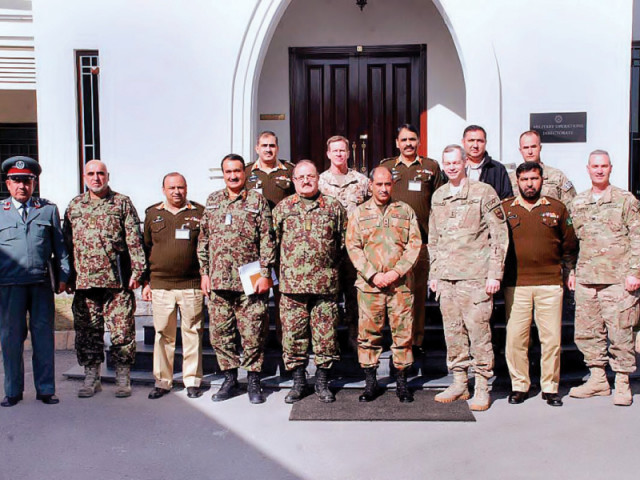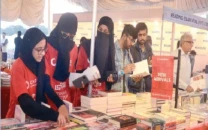IED ingredients: Pakistan pressed to act against fertiliser smuggling
Delegates meet in Rawalpindi to discuss threat faced by the civilian population as well as by security forces.

Officials of Afghan Army, Isaf and Pakistan Army at the General Headquarters. PHOTO: APP
The Nato‑led International Security Assistance Force (Isaf) urged Pakistan on Monday to crack down on the smuggling of a common fertiliser used in improvised explosive devices (IEDs), which have been the major cause of fatalities among the foreign forces in Afghanistan.
A meeting of the Counter Improvised Explosive Device (C-IED) working group’s meeting was held on Monday at the General Headquarters (GHQ) in Rawalpindi. The director general military operations (DGMOs) from Pakistan and Afghanistan attended the meeting, while Isaf was represented by its deputy chief of staff.
The participants discussed in detail measures to counter the IED threat faced by the civilian population as well as by security forces on both sides of the Pakistan-Afghan border. Even though both Afghanistan and Isaf acknowledged steps taken by Pakistan in recent months to stop the smuggling of calcium ammonium nitrate, they insisted that Islamabad must do more, sources told The Express Tribune.
According to the US, approximately 80% of the IEDs used in Afghanistan have homemade explosives as the main charge, while more than 80% are derived from calcium ammonium nitrate, which is produced in Pakistan.
Figures provided by the National Fertiliser Development Centre (NFDC) in Pakistan say less than 10% of the fertiliser used in Pakistan contains calcium ammonium nitrate. According to sources, Pakistan made it clear that it was doing whatever it could to eliminate the threat of IEDs.
“Pakistan alone cannot fight out this battle … other players will have to play their part,” said a military official while requesting anonymity.

An official statement issued by the Inter-Services Public Relations (ISPR) said the participants of the meeting “dwelt at length on measures to counter the IED threat faced by the civil population as well as security forces on both sides of the Pak-Afghan border.”
The statement said the meeting reviewed and expressed their satisfaction over the progress made so far since establishment of the working group as a subcommittee of the tripartite commission.
“The Working Group resolved to take forward the good work already done through more intimate cooperation in the field of counter IED,” it added.
Pak-US discuss defence cooperation
Meanwhile, US Ambassador to Pakistan, Richard G Olson met Chief of the Air Staff Tahir Rafique Butt on Monday to discuss defence cooperation between the two countries. Ambassador Olson and the Air Chief Marshal reviewed the Pakistani F-16 program and visited the home of Pakistan’s F-16s at PAF Base Shahbaz.
“This visit, and the Pakistan Air Force (PAF) F-16 program itself, represent concrete examples of US-Pakistan cooperation to support our shared security goals and to promote peace and stability in the region,” said Olson.
Butt welcomed Olson and said, “Ambassador Olson’s visit is important because it focuses on achieving common objectives and it shows the US and Pakistan working together to strengthen cooperation to support each country’s security interests.”
Published in The Express Tribune, January 22nd, 2013.



















COMMENTS
Comments are moderated and generally will be posted if they are on-topic and not abusive.
For more information, please see our Comments FAQ